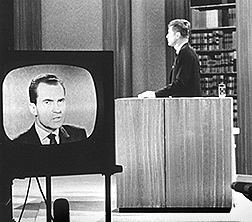Introduction
"The confrontation between Kennedy and Nixon would change politics forever."
The presidential campaign of 1960 signified a political watershed. It was the first campaign in which the candidates of the two major parties appeared together in a series of televised debates. The fact that both candidates agreed to appear on these “Great Debates” constituted recognition by politicians in both major political parties of the power of a medium that had only been available to most Americans for less than ten years.The Great Debates acknowledged a revolution that had taken place in America’s living rooms. According to the census of 1950, only 4,400,000, or 11 per cent, of American families owned television sets.1
By 1960 that number had exploded to 40,000,000, or 88 per cent. Unfortunately for those in the television business, the general perception was that its enormous potential to educate and enlighten had been wasted. Shortly after the 1960 campaign, TV was labeled a “vast wasteland” by the Chairman of the Federal Communications Commission (F.C.C.) Because television had become so important during the 1960 campaign, it was perhaps ironic that the medium’s own image needed burnishing. The Great Debates were an attempt to improve that image by providing a valuable public service. It would enable American voters for the first time to view their potential leaders together in an arena in which both would be required to respond spontaneously to questions of which they had no prior knowledge.2
This paved the way for a series
of  four weekly debates that would require the candidates to make opening and closing remarks
and to respond to questions from a panel of four newsmen. The first debate occurred on
September 26, 1960 and in the words of political historian, Theodore H. White, “the confrontation between Kennedy and Nixon would change politics forever.” Although both men performed creditably in terms of the substance of what they were saying, the visual disparity between the two was stunning. Kennedy appeared cool and in command whereas Nixon appeared nervous and unsure of himself.
four weekly debates that would require the candidates to make opening and closing remarks
and to respond to questions from a panel of four newsmen. The first debate occurred on
September 26, 1960 and in the words of political historian, Theodore H. White, “the confrontation between Kennedy and Nixon would change politics forever.” Although both men performed creditably in terms of the substance of what they were saying, the visual disparity between the two was stunning. Kennedy appeared cool and in command whereas Nixon appeared nervous and unsure of himself.
1Theodore H. White. The Making of the President 1960 (New York: Atheneum House, 1961), 335.
2Ibid., 353.
